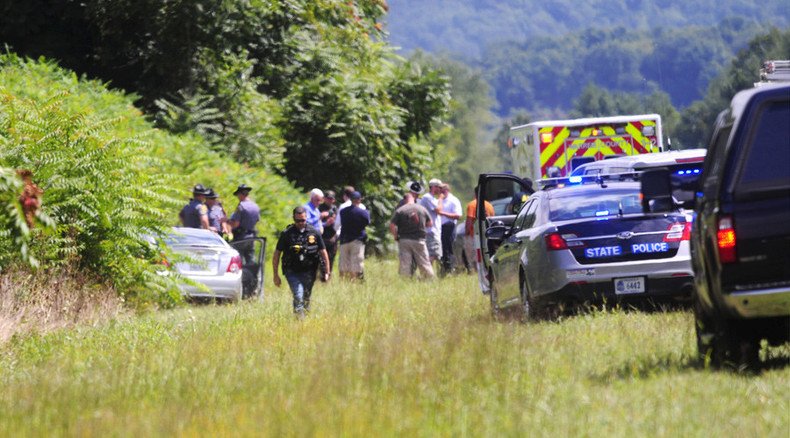BBC journalists covering Virginia shooting 'threatened by police,' forced to delete footage

Two BBC journalists say they were threatened by Virginia police after filming the scene where gunman Bryce Williams crashed and shot himself on Wednesday. They say a cop threatened to confiscate their camera and car if they did not delete their footage.
White House reporter Tara McKelvey and videojournalist Fraz Strasser were among the first to arrive at the scene on I-66, where Bryce Williams – also known as Vester Flanagan – crashed his vehicle and shot himself hours after killing journalists Alison Parker and Adam Ward during a live news broadcast in Virginia.
Strasser tweeted that he and McKelvey were told the footage “could be evidence,” and that they were forced to delete it. He added that a cop by the name of Officer Clark threatened to tow their car because it was apparently illegally parked.
Reason for confiscating camera was that it was evidence. Threatened to tow the car because it was illegally parked.
— Franz Strasser (@franzstrasser) August 26, 2015Strasser said the officer watched him delete his file and let him go. Another officer reportedly “apologized and said we have to understand,” he tweeted.
He noted, however, that the fact that law enforcement wanted to delete “evidence” made him “question their reasoning.”
But why they are then okay with deleting 'evidence' makes one question their reasoning.
— Franz Strasser (@franzstrasser) August 26, 2015Strasser said that he decided to delete the footage because “it was either not being able to work for the rest of the day, without camera or car, or delete crappy footage from far away.” He added that he “chose the latter.”
He and McKelvery were able, however, to recover some photos from the moment they were asked to delete their footage.
We were able to recover photos from the moment police asked us to delete crime scene footage #WDBJpic.twitter.com/p1jzJkgJmv
— Franz Strasser (@franzstrasser) August 26, 2015Strasser's initial tweet quickly gained traction online, and appeared in the BBC's live coverage of the Virginia shootings. Following this, a spokesperson the Virginia police reached out to him on Twitter.
“VSP is aware of this incident and we are looking into it, as such actions violate VSP [Virginia State Police] policy,” Corinne Geller wrote.
Response from Virginia State Police https://t.co/LSYbaTfzP6
— Franz Strasser (@franzstrasser) August 27, 2015The BBC's bureau chief in the US, Paul Danahar, tweeted directly to the VSP spokesperson, asking to “exchange contacts” with her.
Virginia police reportedly have a history of acting against those filming them.
Last year, 19-year-old Devin Thomas was found guilty of disorderly conduct and resisting arrest after recording police activity in his neighborhood, and was sentenced to community service. Thomas said the claims were unwarranted, adding that an officer assaulted him after knocking his cell phone out of his hand.
Another case involved 22-year-old Jeremiah Schwenk, who claimed that a Norfolk officer pushed his camera phone away from him after a confrontation.
The American Civil Liberties Union (ACLU) of Virginia says its office has documented citizens who have been charged for filming police – usually as a violation of wiretapping laws.
“Using the wiretapping law to stop videotaping is a stretch, to be sure, but labeling the videotaping of police as disorderly conduct or obstruction of justice is creating new law out of thin air,” the ACLU of Virginia wrote on its website.












